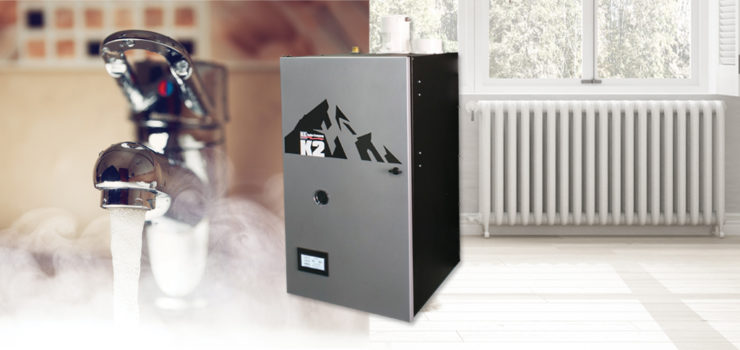A combination boiler, often called a “combi boiler,” offers both space heating and domestic hot water in one package to save space, and in a lot of cases, money.
Modern, high efficiency combi units like U.S. Boiler Company’s K2 Combi and the Aspen combi model are stainless steel condensing boilers with the addition of a built-in secondary heat exchanger to provide domestic hot water to a home or building. During the heating season the combi boiler runs as needed to heat a structure and provide hot water for showers, sinks, and other hot water appliances. During the summer months the combi boiler only fires when there is a call for domestic hot water.
Combi boilers provide energy efficient domestic hot water for two main reasons; these units have a very high operating efficiency and they also have a low internal water volume. This means that in the summer, when space heating is not needed, you are only paying to heat the hot water that you actually need, not a whole tank.
Cost-effective
The upfront cost of installing a combi boiler is generally very competitive to other alternatives. The single appliance typically costs less than installing a boiler and a water heater individually. For the same reason, the labor and materials required to install a combi unit will usually be less too.
Property owners with limited mechanical space may appreciate the use of a high efficiency combi unit. These units can typically be installed in spaces not much larger than a broom closet. For this reason, combi boilers are popular with apartment and condominium owners, and homeowners in regions where homes do not have basements.
Is a combi boiler the best choice for my home?
Providing hydronic space heating and domestic hot water production in one compact combi boiler is a big advantage, especially considering the low installation and operating costs. However, combi boilers are not ideal for every home and heating application. Under most circumstances there will be little or no difference between a combi boiler and a traditional water heater. The exception would be in families that take multiple showers and operate hot-water consuming appliances simultaneously. If that kind of hot water consumption is the norm, ask your professional home heating contractor to show you the comparisons of hot water output so you can make an informed decision on which method of delivering domestic hot water is the best fit for your family. You can browse our site for a heating contractor in your area.

